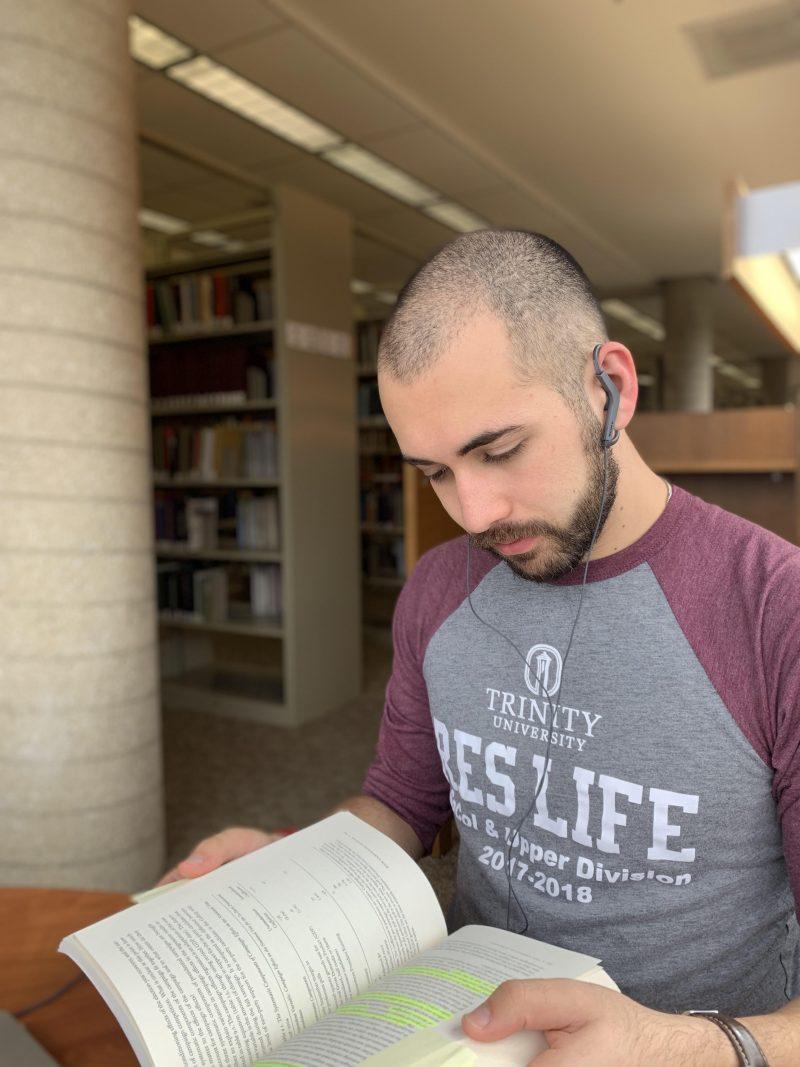Three years ago, Benjamin Brody — current junior and political science major — started his studies at Trinity but found something missing: a Mock Trial Club. Over the course of three years, the club has grown from just a few interested students to 34 total participants, including both competitive members who participate in mock trial competitions and actively attending club members.
Brody got his inspiration for founding the club from a program in which he had been involved in high school known as “Teen Court.” In this program, students who had received misdemeanors got to have a student attorney defend their case in hopes of avoiding harsher sentences such as fines in favor of mandatory community service hours.
“I wanted to continue something like that at Trinity, but I wasn’t sure exactly what,” Brody said. “I knew that Trinity students could benefit from that kind of experience, and I could benefit from it too.”
Brody was not sure what starting an organization on campus would be like and which difficulties he would face, but members of the Trinity community — such as John Hermann, Kristine Howland, Esther Kim and Claudia Stokes, to name a few — made the club’s existence possible in terms of organization and funding. Hermann and Stokes serve as faculty sponsors for the club while Howland encourages and aids the club to seek funding through the Student Government Association and donations from the Board of Visitors.
“Trinity has been unbelievably supportive of our efforts, though we kind of had to prove ourselves,” Brody said. “But once we hit that milestone, demonstrating that we were committed, that we were dedicated … opportunities presented themselves.”
Students who participate and hold leadership roles in the club are also essential to its success.
“If not for outspoken students who want to be attorneys, who aren’t afraid to share their thoughts and opinions, who aren’t scared to critique you when you do something wrong, I probably would have run it to the ground in the first year,” Brody said.
The group replicates the process of preparing and presenting both sides of civil or criminal cases for a courtroom trial and emulates the roles in real court trials, such as witnesses, lawyers and court reporters. One case is assigned per year on a national level and various college-level teams compete against each other.
According to Kathryn Langemeier — senior political science and economics double major and current club vice president — to prepare for competitions the club receives a case packet from their coach and studies the case thoroughly, reading the affidavits to compose an understanding of the situation.
“Then, once we have a general idea of what’s going on, then we start doing [mock trial] rounds pretty consistently until competition because that’s really the only way to prepare,” Langemeier said.
She added that being a competitor requires consistent commitment and hard work, which is why not all members are able to compete. Mock Trial meets on a weekly basis but practices become more frequent and intense as competition season approaches.
In addition, the club attended a scrimmage this past weekend in Dallas to prepare for a regional competition, where they won both their trials. The club’s current president, junior political science and history double major Zoe Heeter, enjoyed the experience.
“It went really well […] It was a good learning opportunity. The competing members got really good exposure, and they all felt a million times better after doing it,” Heeter said.
Many students excel in this environment, such as club member Travis Boyd — who won “Best Witness” out of hundreds of competitors at a competition last year — and Heeter, who was also awarded as a witness.
Trinity recently recognized Mock Trial club for its accomplishments, giving the group the “Tigers On the Rise: Emerging Student Group” award as part of the LeeRoy Awards, and “Earn Your Stripes” for the last two years.
According to Langemeier, the club is not limited to pre-law students but rather is a way to engage with others in a collaborative way. The structure of the club reminds Langemeier of Model United Nations from high school.
“I don’t want to be an attorney, but I do like the argumentation aspect. I like that my public speaking has improved, and it was also a nice way for me to figure out that I don’t want to be an attorney,” Langemeier said.
Brody also sees Mock Trial Club as a way to debate in a positive, productive way.
“In [this age], we don’t know how to engage in conflict without combat. We’re more likely to attack somebody who disagrees with us than hear them out. We’re shutting people out instead of engaging in that dialogue. And [changing] that is what Mock Trial is all about: respectful, professional discourse,” Brody said.
Members of the club also shared their advice for students who are unsure about whether this club fits them.
“It kinda has a bit of everything: if you really like arguing with people, we definitely have that, but if you really like putting on a show, being theatrical, we have that too,” Langemeier said.
“One of the most beneficial things about mock trial, debate or any public speaking event is getting to interact with people,” Heeter said. “I want to make sure that it is always around, always a resource for students.”
While the Mock Trial Club is currently classified as a student organization, its leaders hope to continue to develop its sustainability on campus and role as a university institution.
“My goal is that Mock Trial exists for decades to come, like, I’ll come back for the 50th anniversary and I’ll see the Mock Trial booth and I’ll see students generations down the line advertising [it],” Brody said.







